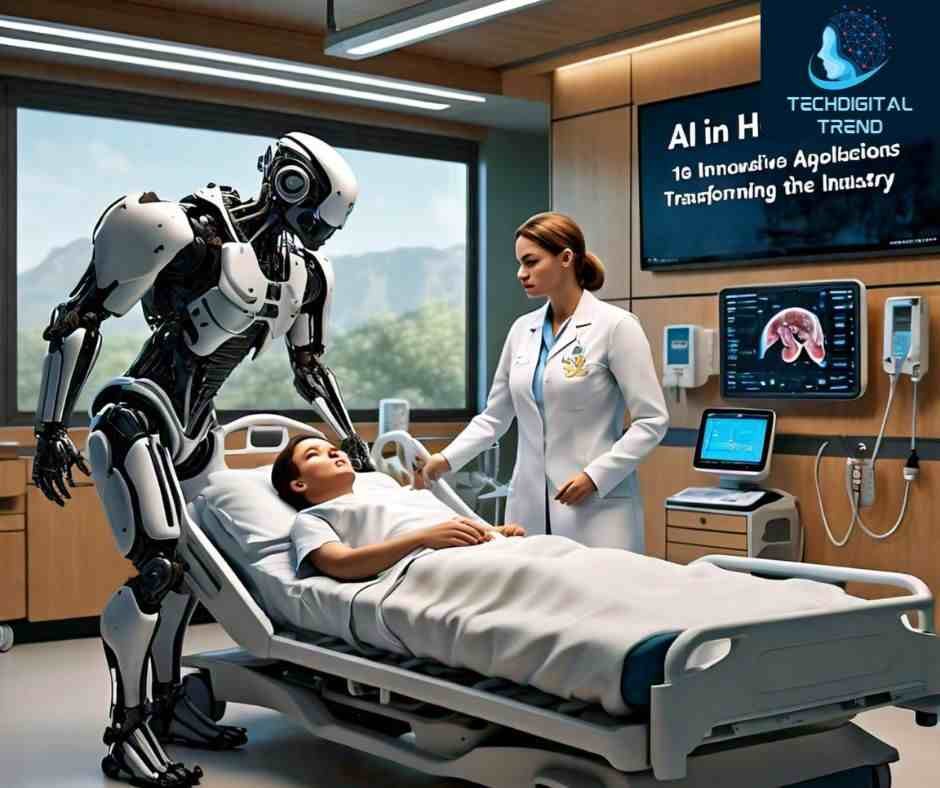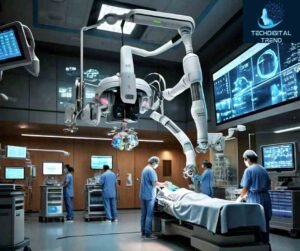Table of Contents
ToggleAI in Healthcare
AI in healthcare industry is on the cusp of a revolution, thanks to the rapid advancements in Artificial Intelligence (AI) technology. In 2024, we’re seeing AI being integrated into various aspects of healthcare, from medical imaging diagnosis to personalized medicine. In this article, we’ll explore the ten ways AI is transforming the healthcare industry and what this means for the future.
Introduction to AI in Healthcare
AI has become more popular in the healthcare sector in recent years, and for good reason. Technology has the ability to raise overall system efficiency, lower costs, and improve patient outcomes in healthcare. AI is being applied in healthcare in a variety of ways, from disease diagnosis to creating individualized treatment regimens.
Applications of AI in Healthcare Imaging
One of the most significant applications of AI in healthcare is medical imaging diagnosis. AI-powered algorithms can analyze medical images such as X-rays and MRIs to detect diseases such as cancer and cardiovascular disease. This technology has been approved for use in hospitals and has already shown promising results.
Future of AI in Healthcare Industry
As AI technology continues to evolve, we can expect to see even more innovative applications AI in healthcare. From personalized medicine to drug discovery, AI is set to revolutionize the healthcare industry in the coming years.
Other Applications of AI in Healthcare
In addition to medical imaging diagnosis, AI is being used in various other ways in healthcare, including:
- Personalized Medicine: AI algorithms can analyze a patient’s genetic data to develop personalized treatment plans.
- Drug Discovery: AI in healthcare can analyze large amounts of data to identify potential drug targets and develop new drugs.
- Predictive Analytics: AI algorithms can analyze patient data to predict disease progression and identify high-risk patients.
1. Electronic Health Records (EHRs)
AI in healthcare can analyze EHRs to:
- Identify patterns and predict patient outcomes
- Recognize possible health hazards and notify medical professionals
- Improve patient care coordination and communication
- Enhance data security and privacy
2. Telemedicine
AI-powered chatbots can:
- Assist patients with scheduling appointments and answering medical questions
- Provide personalized health advice and support
- Help patients manage chronic conditions and medications
- Facilitate remote monitoring and consultations
3. Medical Research
AI can:
- Analyze large amounts of data to identify potential new treatments and drugs
- Help researchers identify potential biomarkers for diseases
- aid in the creation of individualized medicine strategies
- Boost clinical trials’ precision and efficiency
4. Patient Engagement
AI-powered platforms can:
- Engage patients in their healthcare, improving outcomes and reducing costs
- Provide personalized health information and resources
- Help patients manage chronic conditions and medications
- Facilitate patient-provider communication and coordination
5. Healthcare Analytics
AI can:
- Analyze data to identify trends and improve healthcare operations
- Help healthcare providers optimize resource allocation and staffing
- Assist in the development of predictive models for patient outcomes
- Boost data analysis speed and accuracy
6. Supply Chain Management
AI can:
- Reduce expenses and increase efficiency by streamlining supply chain processes.
- Help manage inventory and demand forecasting
- Assist in the development of predictive models for supply chain disruptions
- Improve the accuracy and speed of supply chain data analysis
7. Medical Imaging Analysis
AI can:
- Analyze medical images to detect diseases such as cancer and cardiovascular disease
- Assist radiologists and clinicians in image interpretation
- Help identify potential imaging biomarkers for diseases
- Improve the accuracy and speed of image analysis
8. Personalized Medicine
AI can:
- Analyze genetic data to develop personalized treatment plans
- Help identify potential genetic risk factors for diseases
- aid in the creation of individualized medicine strategies
- Improve the accuracy and speed of genetic data analysis
9. Drug Discovery
AI can:
- Analyze data to identify potential new drugs and drug targets
- Help researchers identify potential drug side effects and interactions
- aid in the creation of individualized medicine strategies
- Improve the accuracy and speed of drug discovery processes
10. Predictive Analytics
AI can:
- Analyze data to predict patient outcomes and identify high-risk patients
- Help healthcare providers optimize resource allocation and staffing
- Assist in the development of predictive models for disease progression
- Boost the precision and velocity of predictive analytics
11. Public Health
AI can:
- Analyze data to identify potential public health risks and trends
- Aid in monitoring and forecasting the transmission of infectious illnesses
- Assist in the development of personalized public health interventions
- Improve the accuracy and speed of public health data analysis
12. Mental Health
AI can:
- Analyze data to identify potential mental health risks and trends
- Help track and predict mental health outcomes
- Assist in the development of personalized mental health interventions
- Improve the accuracy and speed of mental health data analysis
13. Healthcare Workforce Management
AI can:
- Analyze data to optimize healthcare workforce staffing and scheduling
- Help manage healthcare workforce development and training
- Assist in the development of predictive models for healthcare workforce demand
- Improve the accuracy and speed of healthcare workforce data analysis
14. Healthcare Finance
AI can:
- Analyze data to optimize healthcare finance operations
- Help manage healthcare revenue cycle management
- Assist in the development of predictive models for healthcare finance trends
- Improve the accuracy and speed of healthcare finance data analysis
15. Healthcare Policy
AI can:
- Analyze data to inform healthcare policy development
- Help track and predict healthcare policy trends
- Assist in the development of predictive models for healthcare policy outcomes
- Improve the accuracy and speed of healthcare policy data analysis
In conclusion
From customized medication to medical imaging diagnostics, artificial intelligence is transforming the healthcare sector in many ways. Technology is increasing the effectiveness of healthcare systems overall, improving patient outcomes, and cutting costs. We should anticipate even more cutting-edge uses of AI in healthcare as it develops. Keeping up with the newest advancements in AI-powered healthcare is crucial for patients, industry leaders, and healthcare practitioners. We can build a more sustainable and healthful future for all if we embrace AI.
Open this link: Tap to here















